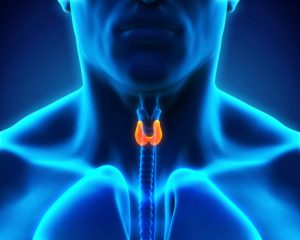
There are many illnesses that can affect the thyroid and disrupt normal bodily functions. One in particular is called thyroiditis. Thyroiditis refers to inflammation of the thyroid gland. Here are the different types of thyroiditis:
5 types of thyroiditis
Hashimoto’s disease: This is the most common form of thyroiditis. The immune system begins to attack the thyroid gland and can lead to hypothyroidism (underactive thyroid, which leads to slower growth and mental development).
Postpartum thyroiditis: Occurs when the thyroid becomes inflamed after giving birth. The result is thyrotoxicosis – high amounts of thyroid hormones in the blood. This can speed up the metabolic rate and disrupt regular bodily functions. It is not a common form.
Subacute granulomatous thyroiditis: This form of thyroiditis can result in pain as well as respiratory infections.
Subacute lymphocytic thyroiditis: This form of thyroiditis can also be referred to as silent thyroiditis, because there is little to no pain when the thyroid gets bigger. Typically, women go through a short period of hyperthyroidism followed by what can become permanent hypothyroidism. This disorder is most common on postpartum women.
Drug-induced thyroiditis: This is commonly caused when drugs interfere with the thyroid.
Causes of thyroiditis

It is unclear as to why a person’s body may produce antibodies that attack the thyroid, but it’s been speculated that thyroiditis runs in families.
Signs and symptoms of thyroiditis
- Firm or enlarged thyroid
- Enlarged and painful thyroid – pain may travel up the jaw to the ears
- Cool, dry skin
- Slowed heartbeat (fewer than 60 beats per minute)
- Swelling around the eyes
- Hoarseness
- Slowed reflexes
- Reduced appetite
- Fatigued and lethargic
- Slight fever
- Constipation
- Intolerance to heat
- Rapid heartbeat, anxiety and sweating
- Weight loss
Postpartum thyroiditis in particular can be difficult to diagnose because it occurs within a year after childbirth. Often the symptoms are attributed to the stress of having a newborn or postpartum depression.
Nutrition and prevention
Medication, and in rare occurrences, surgery may be used for treatment. But to supplement medical treatments it’s important to maintain proper nutrition. For starters you want to eat foods that can lower thyroid activity. These include broccoli, cabbage, spinach and kale – essentially dark leafy greens. Be mindful, though, if your thyroid is underactive you may need to avoid these foods.
Furthermore you will want to avoid foods that are processed, contain sugar, wheat, caffeine and alcohol, which can all worsen the condition. One other caution is the consumption of soy. Some research shows soy may interfere with thyroid hormones, so speak to your doctor if you’re concerned.
Physical Activity – Exercise helps improve thyroid function for both hypothyroidism and hyperthyroidism.
Acupuncture – Acupuncture may help correct hormonal imbalances and address underlying deficiencies and excesses involved in thyroiditis.
Related Reading:
Healthy eating with hypothyroidism
Our thyroid is often overlooked unless a doctor raises concerns about it. Although you may not think about it much it plays a major role in producing hormones and regulating our metabolism. When this process is thrown off it can cause hypothyroidism. Continue reading…
Natural healing for thyroid disorders
Noticing how tired you are, the extra weight you’ve put on for no apparent reason, and your hair seems thin and dry? These are just a few of the many problems a slowdown in the output of the thyroid gland can cause. The older you get, especially for women, the more likely you are to experience thyroid problems. Continue reading…
Sources:
http://www.thyroid.org/what-is-thyroiditis/
http://umm.edu/health/medical/altmed/condition/thyroiditis
http://www.endocrineweb.com/conditions/thyroid/thyroiditis
http://www.mayoclinic.org/diseases-conditions/hashimotos-disease/basics/definition/con-20030293
http://www.mayoclinic.org/diseases-conditions/postpartum-thyroiditis/basics/definition/con-20035474
http://www.nlm.nih.gov/medlineplus/ency/article/000375.htm
http://www.nlm.nih.gov/medlineplus/ency/article/000388.htm
http://www.ncbi.nlm.nih.gov/